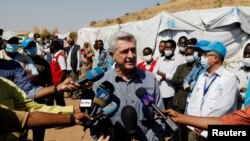The chief of the U.N.’s refugee agency said Thursday he remains “deeply troubled” by the humanitarian situation in the Tigray Region of Ethiopia, noting the number of Eritrean refugees already at risk there.
Filippo Grandi, U.N. high commissioner for refugees, said in a statement Thursday that while aid and food have been distributed at a few refugee camps in the region, aid workers have been unable to access at least two camps since unrest broke out two months ago.
“I am very worried for the safety and well-being of Eritrean refugees in those camps. They have been without any aid for many weeks,” the statement read. “Furthermore, and of utmost concern, I continue to receive many reliable reports and first-hand accounts of ongoing insecurity and allegations of grave and distressing human rights abuses, including killings, targeted abductions and forced return of refugees to Eritrea.”
Approximately 96,000 Eritrean refugees lived in four camps in Tigray prior to the conflict that erupted in November. Many fled the violence to Sudan or to other parts of the country, including the capital, Addis Ababa.
On November 4, Ethiopia’s federal government launched what it called a “law enforcement operation” against “rogue” leaders of the Tigray People’s Liberation Front (TPLF), the region’s ruling party, after TPLF fighters attacked a federal military base. TPLF leaders called the federal government’s response a war against the people of Tigray.
The conflict erupted weeks after Tigray held regional elections in defiance of the federal government.
Some 50,000 people from the region have fled to neighboring Sudan, and tens of thousands have been internally displaced since fighting broke out.





